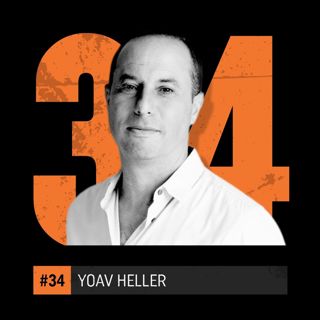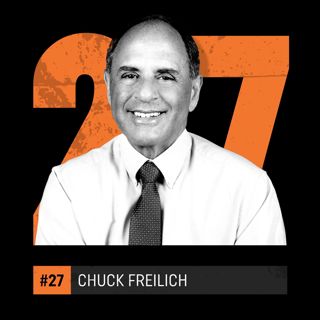
Chuck Freilich: 'Netanyahu needs to step down or be voted out'
Hamas is already beginning to rebuild, Chuck Freilich says, because Israel lacks a post-war vision for Gaza.An Israeli national security expert, Chuck is a senior fellow at the Institute for National Security Studies and has taught at elite American universities like Harvard, NYU, and Columbia. He has spent extensive time in Israel's national security establishment.The author of three books on Israel—Zion’s Dilemmas: How Israel Makes National Security Policy, Israeli National Security: A New Strategy for an Era of Change, and Israel and the Cyber Threat: How the Startup Nation Became a Global Cyber Power—Chuck specializes in Mideast policymaking, US-Israel relations, and national security.Now, he joins Sruli Fruchter to answer 18 questions on Israel, including the ceasefire deal, hostage negotiations, and Hamas' rule in Gaza.This interview was held on Jan. 27.Here are our 18 questions:As an Israeli, and as a Jew, how are you feeling at this moment in Israeli history?What has been Israel’s greatest success and greatest mistake in its war against Hamas?How do you think Hamas views the outcome and aftermath of October 7—was it a success, in their eyes? What do you look for in deciding which Knesset party to vote for?Which is more important for Israel: Judaism or democracy?Should Israel treat its Jewish and non-Jewish citizens the same?What role should the Israeli government have in religious matters?Now that Israel already exists, what is the purpose of Zionism?Is opposing Zionism inherently antisemitic?Is the IDF the world’s most moral army?If you were making the case for Israel, where would you begin?Can questioning the actions of Israel’s government and army — even in the context of this war — be a valid form of love and patriotism?What do you think is the most legitimate criticism leveled against Israel today?Do you think peace between Israelis and Palestinians will happen within your lifetime?What should happen with Gaza and the Palestinian-Israeli conflict after the war?Is Israel properly handling the Iranian threat?Where do you identify on Israel’s political and religious spectrum, and do you have friends on the “other side”?Do you have more hope or fear for Israel and the Jewish People?
3 Feb 1h 3min
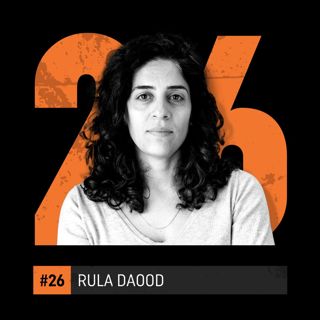
Rula Daood: 'We are closest to peace at times of war'
Take our annual survey.Until the Israeli government sets a plan for Gaza after the war, Rula Daood says, they are choosing to end up with Hamas. A speech pathologist by trade, Rula Daood is now the national co-director of Standing Together, a progressive grassroots movement of Israeli Jews and Palestinians fighting for "full equality for everyone in this land." A Christian Palestinian who is also an Israeli citizen, Rula grew to become a political activist organizing Jewish-Arab partnerships in Israel's mixed cities. Since joining Standing Together in the late 2010s, Raood has propelled the movement's dramatic growth. Alongside her co-director Alon-Lee Green, who is Jewish, Rula was named as one of TIME magazine's 100 emerging global leaders of 2024.Now, she joins Sruli Fruchter to answer 18 questions on Israel, including the ceasefire deal, Gaza's future, and how peace is still possible.This interview was held on Jan. 21.Here are our 18 questions:As an Israeli, and as a Palestinian, how are you feeling at this moment in Israeli history?Can you share more about your experience of October 7?What has been Israel’s greatest success and greatest mistake in the current war against Hamas?Is Standing Together reflective of Israeli society? What do you look for in deciding which Knesset party to vote for?Which is more important for Israel: Judaism or democracy?What role should the Israeli government have in religious matters?What is Zionism for you?Is opposing Zionism ever antisemitic?Can questioning the actions of Israel’s government and army — even in the context of this war — be a valid form of love and patriotism?What do you think is the most legitimate criticism leveled against Israel today?What do you think is the most illegitimate criticism leveled against Israel today?Do you think peace between Israelis and Palestinians will happen within your lifetime?What should happen with Gaza and the Palestinian-Israeli conflict after the war?What do you wish the world knew about the Palestinian communities in Israel?What is a book you think everyone should read about Israel?Where do you identify on Israel’s political and religious spectrum, and do you have friends on the “other side”?Do you have more hope or fear for Israel?
27 Jan 1h 12min
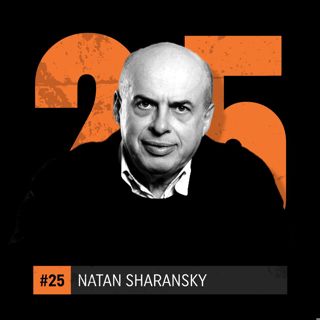
Natan Sharansky: 'If you don't have faith or Zionism, your grandchildren will not be Jewish'
Antisemitism and assimilation are threatening the Jewish People, says Natan Sharansky, but to both Israel offers a solution.Born in the Soviet Union and imprisoned by the authorities when trying to immigrate to Israel, Sharansky experienced brutal interrogations, forced feedings, and torture — sparking international campaigns to fight for his freedom in 1986. Today, Natan is Chairman for the Institute for the Study of Global Antisemitism and Policy and has an extensive record as a human rights activist, Israeli politician, and advocate for the Jewish People. He is the recipient of the Congressional Medal of Honor in 1986 and the Presidential Medal of Freedom in 2006. Now, he joins Sruli Fruchter to answer 18 questions on Israel, including anti-Zionism, hostage negotiations, and the threats of antisemitism and assimilation. This interview was held on Jan. 13.Take our annual survery: https://www.surveymonkey.com/r/WZKXNWRJoin Share in supporting victims of terror on Jan. 25 while learning Torah and connecting to your soul. Sign up for Jerusalem here and Modiin (with David Bashevkin) here.Here are our 18 questions:As an Israeli, and as a Jew, how are you feeling at this moment in Israeli history?What has been Israel’s greatest success and greatest mistake in its war against Hamas?How do you think Hamas views the outcome and aftermath of October 7—was it a success, in their eyes? What do you look for in deciding which Knesset party to vote for?Which is more important for Israel: Judaism or democracy?Should Israel treat its Jewish and non-Jewish citizens the same?What role should the Israeli government have in religious matters?Now that Israel already exists, what is the purpose of Zionism?Is opposing Zionism inherently antisemitic?Is the IDF the world’s most moral army?If you were making the case for Israel, where would you begin?Can questioning the actions of Israel’s government and army — even in the context of this war — be a valid form of love and patriotism?What do you think is the most legitimate criticism leveled against Israel today?Do you think peace between Israelis and Palestinians will happen within your lifetime?What should happen with Gaza and the Palestinian-Israeli conflict after the war?Is Israel properly handling the Iranian threat?Where do you identify on Israel’s political and religious spectrum, and do you have friends on the “other side”?Do you have more hope or fear for Israel and the Jewish People?
20 Jan 1h 8min
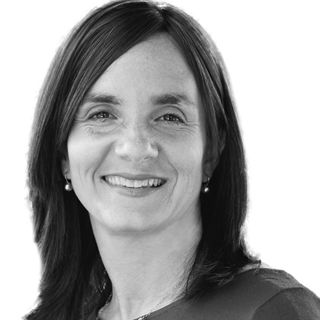
Shayna Goldberg: Inside Israel’s Religious Zionist Community (18Forty Podcast Re-Release)
We don't have a new episode this week, but we invite you to revisit David Bashevkin's conversation with Shayna Goldberg about the unique features of Israel’s Religious Zionist community, originally aired Nov. 26, 2024.This episode is sponsored by Eden Beit Shemesh. Contact Rina Weinberg at info@edenbeitshemesh.com for more details.In this episode of the 18Forty Podcast, we talk to Shayna Goldberg—a teacher, mashgicha ruchanit, yoetzet halacha, and author—about the unique features of Israel’s Religious Zionist community.Jews in America are proud of the institutions and culture built over the past century, but we tend to forget that Israel’s Dati Leumi community has developed its own parallel—and vastly different—culture. In this episode we discuss:How did Rabbi Joseph B. Soloveitchik and Rav Kook lay the groundwork for our different religious communities today?How does religious life in Israel compare with America?How have religious Israeli women’s attitudes toward army service evolved over the years?Tune in to hear a conversation about how deeply Jewish practice and spirituality penetrate everyday life in Israel’s religious communities.Rabbanit Shayna Goldberg teaches Israeli and American post-high school students and is the mashgicha ruchanit in the Stella K. Abraham Beit Midrash for Women in Migdal Oz, an affiliate of Yeshivat Har Etzion. She is a yoetzet halacha, a contributing editor for Deracheha: Women and Mitzvot, and the author of the book, What Do You Really Want? Trust and Fear in Decision Making at Life’s Crossroads and in Everyday Living (2021).References:“Rabbi Soloveitchik Meets Rav Kook” by Jeffrey SaksOrot HaTeshuvah by Abraham Isaac HaCohen KookPrepare My Prayer by Rabbi Dov SingerWorks of Rav ShagarSus Anochi by Rabbi Jacob SassonZeved Tov by Rabbi Zevulun Charlop
13 Jan 1h 58min
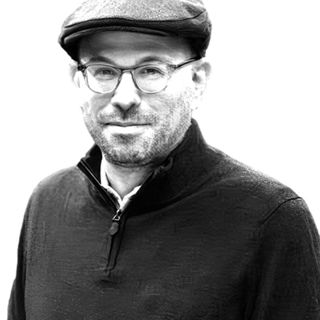
Jonathan Gribetz: Teaching the Palestinian-Israeli Conflict (18Forty Podcast Re-Release)
We don't have a new episode this week, but we invite you to revisit David Bashevkin's conversation with Jonathan Gribetz teaching about Israel in the Ivy League, originally aired Jan. 12, 2024.In this episode of the 18Forty Podcast, we talk to Jonathan Gribetz, a Princeton professor and scholar of Near Eastern and Judaic studies, about the history of Israel and Palestine.At a time in which we can feel as if we’re all at war, it may be helpful to take a step back and look at the full history between Arabs and Israelis, to gain a deeper understanding of the challenges we face in 2024. Jonathan Gribetz helps us do this. In this episode we discuss:What was discourse between Jews and Arabs like during the infancy of Zionism?When and how did this discussion begin to deteriorate and become often counterproductive?What can a current Ivy League professor teach us about discussing Israel today?Tune in to hear a conversation about how we might seek out the seeds of a reconciliation between the descendants of Isaac and the descendants of Ishmael.Interview begins at 5:02.Jonathan Marc Gribetz is Associate Professor of Near Eastern Studies and Judaic Studies at Princeton University, where he teaches about the history of Jerusalem, Palestine, Israel, and Jewish and Arab nationalisms. He is the author of Defining Neighbors: Religion, Race, and the Early Zionist-Arab Encounter.References:Defining Neighbors: Religion, Race, and the Early Zionist-Arab Encounter by Jonathan Marc Gribetz“‘A Question That Outweighs All Others’: Yitzhak Epstein and Zionist Recognition of the Arab Issue” by Alan DowtyThe Zionist Idea by Arthur HertzbergZionism: An Emotional State by Derek J. Penslar1929: Year Zero of the Arab-Israeli Conflict by Hillel CohenArabs and Israelis: Conflict and Peacemaking in the Middle East by Abdel Monem Said Aly, Shai Feldman, and Khalil ShikakiClima TwinsTime and Difference in Rabbinic Judaism by Sarit Kattan GribetzGenesis 15:15
6 Jan 1h 18min
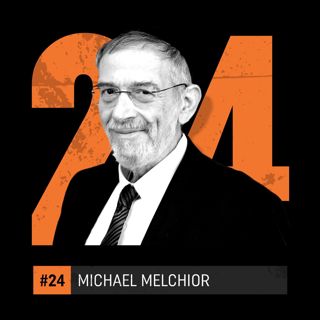
Michael Melchior: 'We can make peace with the whole of the Arab and Muslim world'
There is a time to wage wars, Rabbi Michael Melchior says, and there is a time to make peace.An internationally renowned Jewish leader, thinker, and activist, he has long dedicated his life to fighting for human rights and peace—whether for Soviet Jews in the 1960s or Palestinians and Israelis in 2024. In the past, he was a representative of the Meimad Knesset Party, International Director of the Elie Wiesel Foundation for Humanity, and founder with the late Sheikh Abdullah Nimer Darwish of the Religious Peace Initiative, where he is still active today. The list of his accolades and accomplishments are long.Now, he joins Sruli Fruchter to answer 18 questions on Israel, including the Israel-Hamas War, prayer after October 7, and why peace is still possible. This interview was held on Dec. 25.Here are our 18 questions:As an Israeli, and as a Jew, how are you feeling at this moment in Israeli history?What has been Israel’s greatest success and greatest mistake in its war against Hamas?How have your religious views changed since Oct. 7? What do you look for in deciding which Knesset party to vote for?Which is more important for Israel: Judaism or democracy?Should Israel treat its Jewish and non-Jewish citizens the same?Now that Israel already exists, what is the purpose of Zionism?Is opposing Zionism inherently antisemitic?Should Israel be a religious state?If you were making the case for Israel, where would you begin?Should all Israelis serve in the army?Can questioning the actions of Israel’s government and army — even in the context of this war — be a valid form of love and patriotism?What do you think is the most legitimate criticism leveled against Israel today?Do you think the State of Israel is part of the final redemption?Is Messianism helpful or harmful to Israel?Do you think peace between Israelis and Palestinians will happen within your lifetime?Where do you identify on Israel’s political and religious spectrum, and do you have friends on the “other side”?Do you have more hope or fear for Israel and the Jewish People?
30 Dec 20241h 17min
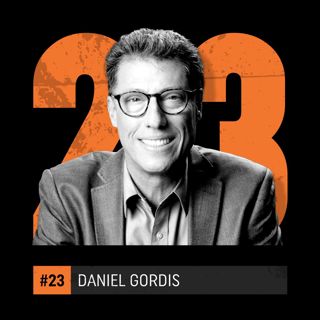
Daniel Gordis: ‘The great failure of the hostages is enormous’
With over 100 hostages still trapped in Gaza, Daniel Gordis says, that is Israel's greatest failure to date—even if it's unclear that any deals would have gotten them back.An acclaimed writer and author, Daniel Gordis is a Koret Distinguished Fellow at the Israeli liberal arts institution Shalem College and writes for his 41,000 subscribers on his Substack, Israel From the Inside. From Israel: A Concise History of a Nation Reborn to Impossible Takes Longer, Daniel's award-winning books probe the inner logic and history of Israel, Zionism, and the Jewish People—and are considered must-haves on bookshelves around the globe.Now, he joins Sruli Fruchter to answer 18 questions on Israel, including the IDF's morality, the hostage crisis, the Iranian threat, and so much more.This interview was held on Dec. 15.Here are our 18 questions:As an Israeli, and as a Jew, how are you feeling at this moment in Israeli history?What has been Israel’s greatest success and greatest mistake in its war against Hamas?How do you think Hamas views the outcome and aftermath of October 7—was it a success, in their eyes? What do you look for in deciding which Knesset party to vote for?Which is more important for Israel: Judaism or democracy?Should Israel treat its Jewish and non-Jewish citizens the same?What role should the Israeli government have in religious matters?Now that Israel already exists, what is the purpose of Zionism?Is opposing Zionism inherently antisemitic?Is the IDF the world’s most moral army?If you were making the case for Israel, where would you begin?Can questioning the actions of Israel’s government and army — even in the context of this war — be a valid form of love and patriotism?What do you think is the most legitimate criticism leveled against Israel today?Do you think peace between Israelis and Palestinians will happen within your lifetime?What should happen with Gaza and the Palestinian-Israeli conflict after the war?Is Israel properly handling the Iranian threat?Where do you identify on Israel’s political and religious spectrum, and do you have friends on the “other side”?Do you have more hope or fear for Israel and the Jewish People?
23 Dec 20241h 30min
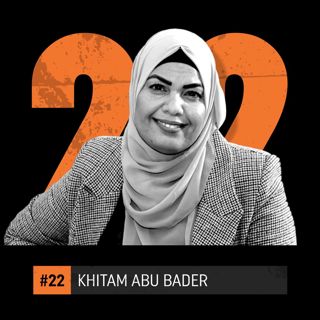
Khitam Abu Bader: 'Violence is never the answer'
Violence is never the answer for Khitam Abu Bader. That's why she tries to fight for peace.Khitam is helping to build Ma'oz Darom South by promoting regional development in the Negev, collaborating with local leaders, and empowering communities. She has extensive experience in leadership and youth development, previously directing the Raidat Leadership Program for Women at Desert Stars and the Arab sector activities of Krembo Wings for youth with and without disabilities.The Bedouin social activist finds herself in a complicated position with Israel's military campaign in Gaza: As a person dedicated to creating a shared society in Israel, and as a Palestinian and Arab woman, Khitam mourns Jews, Israelis, and Palestinians. She constantly tries to emphasize our "shared humanity" in the hopes for coexistence.Now, she joins Sruli Fruchter to answer 18 questions on Israel, including what Zionism is for her, how October 7 affected her, and whether peace is possible.This interview was held on Dec. 11.Here are our 18 questions:As an Israeli, and as a Bedouin, how are you feeling at this moment in Israeli history?Can you share more about your experience of October 7?How have your religious views changed since October 7? What do you look for in deciding which Knesset party to vote for?Which is more important for Israel: Judaism or democracy?What kind of work do you do to create a shared society?What role should the Israeli government have in religious matters?What do you see when bringing Arab and Jewish students together?What is Zionism for you?If you were making the case for Israel, where would you begin?Can questioning the actions of Israel’s government and army — even in the context of this war — be a valid form of love and patriotism?Do you think peace between Israelis and Palestinians will happen within your lifetime?What should happen with Gaza and the Palestinian-Israeli conflict after the war?What does the world misunderstand about Israeli society?What is a book you think everyone should read about Israel?What do you wish the world knew about the Palestinian and Bedouin communities in Israel?Where do you identify on Israel’s political and religious spectrum, and do you have friends on the “other side”?Do you have more hope or fear for Israel?
16 Dec 20241h 1min
